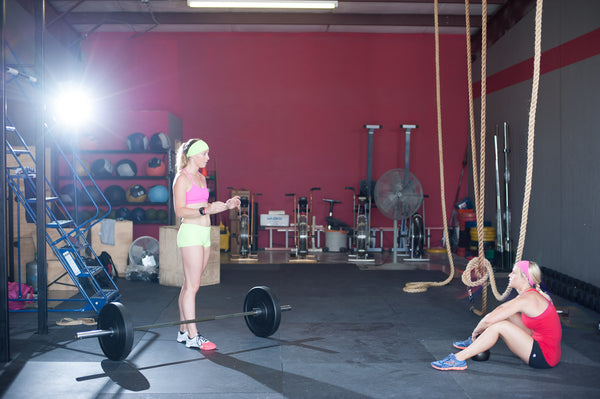- Continue Shopping
- Your Cart is Empty
5 Sure-Fire Ways to Recover from a CrossFit Workout and Get Stronger in the Process

You may have done 5 rounds of 20 reps of wall ball shots, lifted 4 sets of your 12- rep max for bar bell thrusts, swung the kettlebell 4 set of 15 reps, box jumped your butt off, climbed the rope to heaven and back and done everything else on the workout of the day (WOD) whiteboard, but you know what? You haven't gained an ounce of muscle from your CrossFit hell...yet.
Muscle growth can only happen AFTER you've stopped the workout and that makes your recovery strategy critical. As pointed out by Bodybuilding.com, "Muscles don't grow in the gym; they grow after. When you lift heavy, muscles suffer micro-tears and are actually broken down via a process called catabolism. Immediately after you lift, your body begins repairs, but it needs your help."
5 SURE-FIRE WAYS TO SPEED UP MUSCLE RECOVERY POST WORKOUT
#1 Avoid Utter Exhaustion
For those athletes who have heard the phrase "no pain, no gain" since they first started a fitness program, this first workout recovery tip seems counter-intuitive if not downright blasphemy! While it is important to push oneself beyond that which is comfortable, it is not necessary to push past exhaustion EVERY time they open the box.
The best advice is to push yourself past what you did in the previous workout. Pushing the muscles just to the point where they can be repaired with rest and recovery is the optimal approach. Most (good) CrossFit trainer can help you determine this workout calculus.
#2 Proper Pre and Post Nutrition Can Speed Recovery
Most CrossFit athletes understand the importance of post-workout nutrition – that's why there are so many people walking around, drenched in sweat and drinking a protein shake! However, the food consumed before the workout can also play an important role in post-workout recovery. As noted in a recent article, "Digestion is a lengthy process; proteins and carbs that you ingest prior to the workout will still be circulating in the body afterward. For this reason, choose your foods wisely. Make sure you get high-quality, lean protein along with some complex carbohydrates, especially if you plan on an intense workout. I recommend consuming your meals roughly two hours prior to your workout to avoid digestive issues or cramps." The potassium found in bananas is also an excellent recovery fuel.

Post-workout protein, especially whey, is vital if you haven't eaten anything for hours. Aim for 20-50 grams of protein after each workout depending on your bodyweight. Most women will do fine with 20 grams, while men should aim for the upper range.
#3 Post-Workout Stretching is Necessary for Muscle Repair
This is an often overlooked tip for workout recovery, since many CrossFitters view stretching as a monumental waste of time. However, fitness experts and body builders know that proper stretching of exhausted muscles not only jump-start the recovery process but also build flexibility that allows for more muscle gain in most compound lifts.
#4 Take A Hot Bath, Get Some Sleep and Hydrate!
Speeding up muscle recovery does not have to be complicated. According to trainer, Dan DeLisle, "A hot bath is another great way to foster a faster recovery. This will increase blood circulation to the muscle tissue, which then means greater oxygen and nutrient delivery – two things that your tissues need for repair. A hot bath before bed can also lull you to sleep easier, and sleep is another very vital part of the recovery equation.

"If you aren’t getting at least 8 hours of sleep per night, it could be one reason you aren’t seeing the recovery you hope you would. Stay away from the alcohol and caffeine several hours before bedtime, but drink plenty of water."
#5 Take 2 or 3 Days Off Every Week
Muscles that have been torn down by extensive work need a few days every week to repair themselves. DeListle notes, "The professional athlete standard of no days or only one day off per week will likely not be enough for those of us doing intense CrossFit training sessions. Instead, aim for two or three days off per week from all intense exercise.
"Do some leisure exercise if you wish, schedule mobility or yoga classes as mentioned previously, but most importantly, re-energize yourself for the week ahead."
Do you have a post-workout tip for helping tired, sore muscles recover quicker? Contact us and we will share with our readers.




